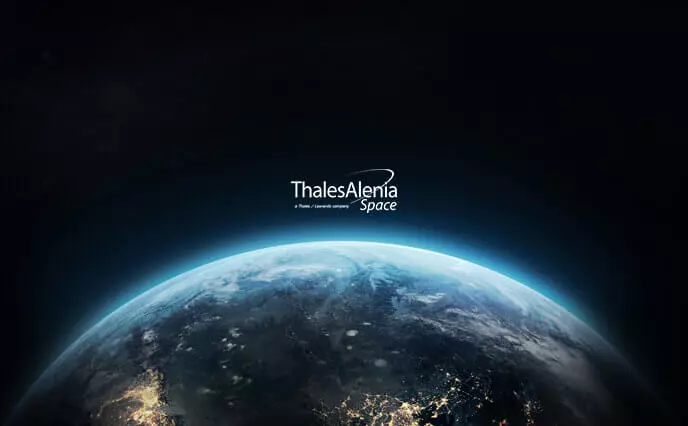Cannes, February 9, 2016 – Thales Alenia Space is celebrating today the signing with the European Space Agency (ESA), for the contract worth €450 million, to build the Sentinel-3C and D environmental monitoring and oceanographic satellites for the European program Copernicus.
Thales Alenia Space is once again prime contractor for these two new satellites, as for the Sentinel-3A and 3B satellites, with responsibility for design, development, integration and testing. These satellites are compatible with the European light launcher, Vega, and will each be fitted with four main instruments:
Thales Alenia Space is once again prime contractor for these two new satellites, as for the Sentinel-3A and 3B satellites, with responsibility for design, development, integration and testing. These satellites are compatible with the European light launcher, Vega, and will each be fitted with four main instruments:
- Two optical instruments: one dedicated to the color of the oceans, OLCI (Ocean and Land Color Instrument), and a Sea and Land Surface Temperature Radiometer (SLSTR)
- Two radar instruments: a Synthetic aperture Radar ALtimeter (SRAL) completed by a MicroWave Radiometer (MWR), used to provide versatile capability of surface topography measurement with primary mission over the oceans but offering also sea ice, ice and in land waters and land capabilities.
Slated for launch as from 2021, the Sentinel-3C and 3D satellites are an integral part of Europe’s vast Earth observation program Copernicus (formerly known as GMES), headed by the European Commission (EC) in partnership with the European Space Agency (ESA). Copernicus aims to ensure European independence in the acquisition and management of our planet’s environmental data, to provide sound support for Europe’s authorities and decision-makers.
Each satellite, Sentinel-3C and 3D, will weigh approximately 1.2 metric tons at launch, and will be positioned in low Earth orbit (LEO) at an altitude of 815 kilometers.
The main objective of the Sentinel-3 mission is the global observation of oceans and land, including their “color” and temperature, along with a precise measurement of ocean heights. ESA’s Sentinel programs include six families of satellites, each fitted with instruments for their specific missions. Sentinel-3 will ensure continuity with the optical observation data provided by Envisat. Sentinel-3A, scheduled for launch in mid-february 2016, will mark the start of this operational service. Sentinel-3B is now being integrated at Thales Alenia Space’s plant in Cannes, southern France, and is scheduled for launch in mid-2017.
“We are extremely proud of winning this major contract, which confirms Thales Alenia Space’s long-standing expertise in the manufacture of Earth observation satellites and instruments,” said Jean Loïc Galle, CEO of Thales Alenia Space. “Our selection by ESA also shows that we have the capabilities needed to meet the technological challenges of this program, while making a major contribution to Europe’s environmental protection strategy, today and for years to come.”
Along with Europe’s leading role in this sector, France and Thales Alenia Space, with significant backing from French space agency CNES, play a pivotal role in Earth observation programs. For example, Thales Alenia Space has been in charge of all generations of Meteosat meteorology satellites, the very successful series of Jason climatology/oceanography satellites, the third of which was launched on January 17, 2016, and the family of IASI interferometers, used for atmospheric monitoring.
About Thales Alenia Space
Thales Alenia Space, a joint venture between Thales (67%) and Finmeccanica (33%), is a key European player in space telecommunications, navigation, Earth observation, exploration and orbital infrastructures. Thales Alenia Space and Telespazio form the two parent companies' “Space Alliance”, which offers a complete range of services and solutions. Because of its unrivaled expertise in dual (civil/military) missions, constellations, flexible payloads, altimetry, meteorology and high-resolution optical and radar instruments, Thales Alenia Space is the natural partner to countries that want to expand their space program. The company posted consolidated revenues in excess of 2 billion euros in 2014, and has 7,500 employees in eight countries. www.thalesaleniaspace.com
Thales Alenia Space, a joint venture between Thales (67%) and Finmeccanica (33%), is a key European player in space telecommunications, navigation, Earth observation, exploration and orbital infrastructures. Thales Alenia Space and Telespazio form the two parent companies' “Space Alliance”, which offers a complete range of services and solutions. Because of its unrivaled expertise in dual (civil/military) missions, constellations, flexible payloads, altimetry, meteorology and high-resolution optical and radar instruments, Thales Alenia Space is the natural partner to countries that want to expand their space program. The company posted consolidated revenues in excess of 2 billion euros in 2014, and has 7,500 employees in eight countries. www.thalesaleniaspace.com


